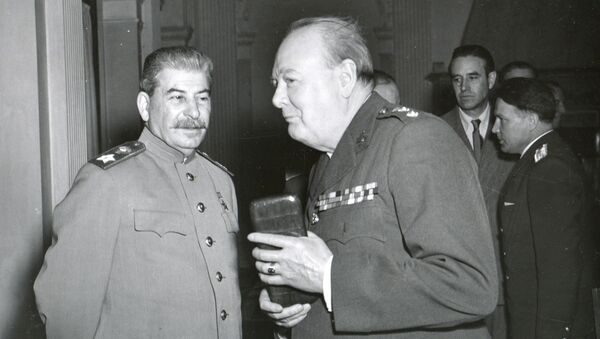Russian film critics are divided about a new film, The Death of Stalin, which is due to come out in cinemas across Europe next month.
"Today we don't really have an official idea of Stalin. Is he a good guy or a bad guy? Is he an evil character? Can we mock him, even if he is evil, or we can't? No one knows before the film comes out," Anton Dolin, editor-in-chief of Art of the Film magazine, told Sputnik.
Dmitry Babich, a journalist and member of the Russian Association of Film Critics, said The Death of Stalin looked like a "stupid movie."
"I understand the motive. They think they are laughing at the dictator. They are portraying historical figures as jesters and clowns but it's so badly made and so lacking in humor.”
Mr. Babich likened the film to Sacha Baron Cohen's The Dictator, which mocked Middle Eastern despots like Saddam Hussein and Muammar Gaddafi.
The Death of Stalin stars British actor Jason Isaacs as General Zhukov, Monty Python legend Michael Palin as Foreign Minister Molotov and US actor Steve Buscemi as Khrushchev.
It was written by Scottish comedian Armando Iannucci, who is best known for writing the political satire The Thick of It and for the 2009 film In the Loop, which was a parody of the invasion of Iraq.
Stalin and Soviet Cinematography
Stalin appeared in many Soviet films but was usually shown as a secondary figure to Lenin and by the time films were being made about the war — in the late 1950s — Stalin's personality cult was over and he was "airbrushed" out of many movies, according to Mr. Dolin.
He said Khrustalyov, My Car! — an important arthouse movie — came out in 1998 and told the story of The Doctors' Plot, an episode of paranoia at the end of Stalin's life when he accused prominent Jewish doctors of conspiring to murder the entire Soviet leadership but it only had a small scene of Stalin on his deathbed.
When Stalin was alive, criticism of him was impossible, great actors portrayed him and he was usually shown wearing a shiny white uniform, Mr. Babich told Sputnik.
"Then for 35 years he vanished from Soviet cinema. In 1953 the cult of Stalin stopped, straight after his death. After perestroika there were more movies and books written about Stalin. The negative ones outnumbered the positive," said Mr. Babich.
He believes Iannucci's film "trivializes" a complex character.
"Stalin was a tragic figure, a monster, but he was a complicated figure, a product of the Russian revolution," said Mr. Babich, who said the best film made about him was The Funeral of Stalin (Pokhorony Stalina) in 1990.
Another good film about the period, said Mr. Babich, was The Cold Summer of 1953, which came out in 1988 and told the lives of villagers who were overrun by gangsters who had escaped from one of Stalin's gulags.
Humor in Film
In the last 10 or 15 years we could see Stalin in film but no one risked to show him as a real icon or hero, and no one really risked to show him as a real tyrant or evil guy — it was like a big official secret, according to Mr. Dolin.
He said he was not aware of any Russian films in which Stalin was mocked and he said a film like The Death of Stalin would probably not be made in Russia and may struggle to get a distributor too, as it was seen as too dangerous a topic for comedy.
However, Mr. Babich said Russian audiences do have a sense of humor and were prepared to laugh at their own leaders.
"Soviet era humor was very funny. It was based on the gap between the propaganda and real life. For example people would joke about Communist Party speeches about the country having been on the edge of a precipice and then taken a great step forward.”
Mr. Babich said two of the greatest Russian comedians, Gennady Khazanov and Arkady Raikin, had poked fun at Stalin. He said there had been several comedy films poking fun at Brezhnev as well as some films about Stalin in the 1990s.
Mr. Babich also said the 2003 German film Good Bye Lenin!, which was set in East Germany shortly after the Berlin Wall came down, had been very popular in Russia. It tells the comical story of an ardent communist who falls into a coma in 1989. When she awakes her son tries to protect her from the reality of the collapse of the German Democratic Republic.
Mr. Dolin said the new film about Stalin looked "quite funny" but he was not sure how it would be received if it was shown in Russia.
He pointed out there had been protests about another film, Matilda, which tells the story of a love affair between Tsar Nicholas II and a Polish ballet dancer, Mathilde Kschessinska.
The current controversy about the film Matilda is because Tsar Nicholas II, who was executed by the Bolsheviks, has been canonized by the Russian Orthodox Church and priests are among the film's most vociferous critics.


